Reflecting on a Championship Decade with Ex-LA Kings & Blackhawks Assistant Jamie Kompon
- Updated: December 23, 2019
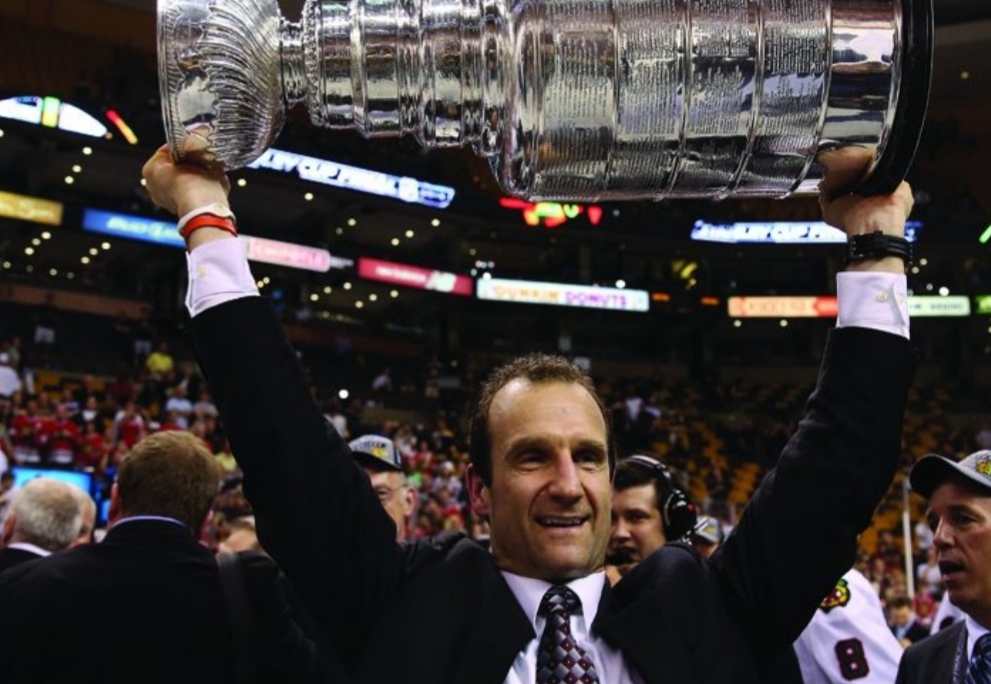
Photo credit: Bruce Bennett/Getty Images
As the decade draws to a close, we can’t resist looking back on the highlights from said timeframe. While there are numerous angles and storylines to take from the 2010’s, fans of the Los Angeles Kings can’t help but glow at their team’s success this past decade.
While the club has certainly had its share of struggles in recent years, anyone would be remiss if they did not identify this past decade with Stanley Cup glory for the Kings — achieved in 2012 and again in 2014.
One thing that made the 2010’s special, though, was the fact that, for the first time since the 1970’s, the NHL had three different teams win multiple Stanley Cups. In addition to the Kings, the Chicago Blackhawks and Pittsburgh Penguins also accomplished the feat, with the latter being the first NHL team to win consecutive championships in 19 years. Additionally, these three teams remain the only three to accomplish this feat in the salary cap era.
For one man, though, he had the privilege of being behind the bench with two of these clubs, earning Stanley Cups in back-to-back years: first with the Kings in 2012 and then the Blackhawks in 2013.
A New Era, A New Hope
Hired by the Kings in 2006, Jamie Kompon joined a brand new coaching staff with a new general manager in Dean Lombardi and, if you will, a new lease on life. But, while Lombardi had implemented a five-year rebuilding plan, Kompon — also the club’s Director of Amateur Development from 2006 from 2008 — knew that it took patience if his new team was going to become a championship contender.
I recently spoke with Jamie Kompon, who shared his experiences from joining the Kings, to hoisting the Stanley Cup for a second-straight year in 2013 to so much in between.
“I honestly believe that when I got to L.A., we were under the understanding that we were going through this rebuild,” Kompon started. “But, sometimes it’s a little harder to be patient, especially as a coach because you’re the one going out there every day and trying to win when it looks a little bleak with the lineup that you do have.”
While they may have struggled early on, it was clear to fans and experts alike that the Kings had gradually strengthened their on-ice product. The aforementioned Dean Lombardi, as well as his scouting staff, deserve a large deal of kudos for this progression — something Kompon could easily attest to.
“Dean made it a priority to make sure that we treated every player and every person as an asset,” the former Kings assistant coach explained. “We wanted to make sure that we got the most out of that player or we could get that player to the highest level that he’s going to be an asset where we can get value for him, or he’s going to be part of our core group. When [Lombardi] presented that to us, it was a real eye-opening experience because you want to make sure that you have the right core, you want to make sure that you have the right people and the culture that is going to be created is critical.
“Obviously drafting Anze Kopitar and then having some young players in place with Dustin Brown, drafting Drew Doughty and then getting more pieces was critical. We had an older team, basically guys who were journeymen mixed with some youth also, but with that, we made them the best and when it came time to the trade deadline, there was an opportunity to get something for them.
Adding Pieces to the Championship Puzzle
While Kopitar and Brown were drafted by his predecessor, Dave Taylor, Lombardi was certainly appreciative of the assets he already had upon joining the Kings. Of course, as Kompon had said earlier, Lombardi wanted every player treated as an asset and the reality was that not everyone could be part of the Kings roster, long- or even short-term.
“It sounds bad but we were able to acquire draft picks and players that would support us the following year or for as long as we needed to get [the rebuilding plan] up and running and our development of our young players to get to that next level where we could start introducing them as part of our core, to our team,” Kompon continued before discussing Lombardi’s impressive track record with his former team.
“Looking back at the San Jose Sharks when Dean was there, I think that just speaks volumes because you look back and see how that team was built: through some trades but also through the draft,” the veteran coach added. “Dean put a lot of players in the lineup through the draft and how he developed those players into perennial players and the Sharks into a perennial playoff team for years to come, and that’s what he wanted to develop with L.A.”
A Method to the Madness
From drafting future stars like Patrick Marleau and Ryane Clowe to trading for future Hall-of-Famer Teemu Selanne as well as Cup-winning veterans Mike Vernon and Adam Graves, Lombardi was able to point the once-hapless Sharks into the right direction as the club increased their points total in each of the future Kings GM’s first six seasons there. Yet, because he didn’t enjoy immediate success in Los Angeles, Lombardi knew that he had a tall task in front of him with the Kings: keeping a long-suffering fanbase patient. Of course, while the Kings may not have enjoyed the same regular-season success that the Sharks had earlier, they eventually came to have far more playoff success — something that Kings fans are, to this day, quick to remind their NorCal rivals of. Nevertheless, before the Kings ended their playoff drought in 2010, Kompon, in spite of his club’s on-ice frustrations, knew that there was light at the end of tunnel, especially with Lombardi running the show.
“There was a method to his madness, “ emphasized Kompon. “You can call him a mad scientist or whatever you want to call him, but he was right in how he did it. It was amazing with the picks that he got and the way that he and his staff drafted with the players that we got: Wayne Simmonds, your Oscar Mollers, obviously your Drew Doughtys, but your players down the roster like your Jonathan Quicks and your Jeff Zatkoffs, Alec Martinez, the signing of Jake Muzzin — all of these players became so instrumental. Then, to make a trade for Jarret Stoll and Matt Greene [from Edmonton in 2008] for Lubomir Visnovsky, those types of things were so critical to us getting to that next stage and when you acquire so many of these young players, you need to start sprinkling in some veterans.
“It was a shame to see Brayden Schenn leave and it was a shame to see Wayne Simmonds leave but to get Mike Richards [from Philadelphia in 2011] in return, who was a younger player but a veteran player, was great. He experienced different things: he won at every level, the ultimate competitor, he was the captain. You have to give up something to get something and because we acquired so many assets, we were allowed to do this, we were allowed to go out and get a veteran player. Then, when we had the opportunity to acquire Jeff Carter for Jack Johnson [from Columbus in early 2012], that was almost a no-brainer because we needed some scoring up front, we needed some depth up front, but it also allowed us to bring Slava Voynov up [from the AHL], so it was a win-win. We had a great offensive player and a right-handed defenseman into a lineup who had already been there when we had some injuries, so we got a sneak-peak at what [Voynov] was capable of doing. So, when Dean came in, you could slowly start to see things come around, and it took some time and there were growing pains. We went through a couple coaches, unfortunately, and I was very fortunate that I was able to survive that, but it was an unbelievable experience to go through it.”
As euphoric as he felt when he and the Kings won the Stanley Cup in 2012, however, Kompon had moved on shortly after.
Taking His Talents to the Windy City
With his contract expired, Kompon was a free agent himself as head coach Darryl Sutter elected not to keep him in the fold in Los Angeles. As the old adage goes, though, when a door closes, a window opens as Kompon quickly found himself reunited with a couple of old colleagues in Chicago, joining the Blackhawks’ coaching staff.
“The biggest thing is that I was able to be was to be in the right place at the right time,” Kompon said of his hiring. “Having worked with Joel Quenneville and Mike Kitchen prior to [with the St. Louis Blues], the quality of people they were and that was important for quality coaching.”
Despite ending their own Stanley Cup drought in 2010, though, the Blackhawks seemed to be far from their championship form, especially off the heels of a first-round exit in 2012 at the hands of the underdog Phoenix Coyotes.
Still, the Windy City was the backdrop for Kompon’s newest opportunity — one he could not have been more excited for.
“[Quenneville and Kitchen] had already won [the Stanley Cup] in 2010 [with the Blackhawks] and to see them win and how they won, they were at the stage where [the Kings] were in 2012, so when they had started to build, their younger players had gotten better and better and better,” explained Kompon. “[The Blackhawks] had been through some pretty lean years and now the young players step in with the right coach and the right ability to play within their strengths and then sprinkling some veterans and see them win in 2010.
“You’re not usually going to have that success because the parity in the NHL is incredible. So, for that, it was really tough for [the Blackhawks] to sustain that and when you win, you don’t realize how hard it really is until it’s over, and then you have to get back at it in two months time. So, I think that that was a bit of a shock for them. In ‘12, it was the same thing [with the Kings].”
Due to the NHL lockout, the 2012-13 season was delayed, which was good news for a Kings team who needed the extra rest. Yet, when the lockout ended in January 2013, while the Kings were poised to defend their crown, the Blackhawks kicked off the campaign with little expectations. Yet, the abbreviated 48-game season saw the Hawks tear through the first half of said campaign, earning points in each of their first 24 games, winning 21 of them.
“In ‘13, the Hawks had the right mix. We had the right veterans — and you could see that they were determined that they weren’t going to be denied; and we came out like a house on fire,” Kompon stressed. “Everybody was clicking on all cylinders. Corey Crawford had something to prove as he had a little bit of a chip on his shoulder because of the naysayers saying that he’s not good enough to be a No. 1 goaltender. There was something to prove there for him and for the whole group, and we knew where we were at as a coaching staff to get these guys to get to the next level. It was incredible to see our progression because we never experienced that much adversity during the season because of the record and the run that we went on.”
As prepared as the Blackhawks were for a long playoff run, though, they were missing a certain ingredient. At the trade deadline, the Hawks found it in the form of someone Kompon knew quite well from his time in both Los Angeles and St. Louis.
“We needed another piece, another centerman to play with Patrick Kane and Patrick Sharp. We knew Michal Handzus was available and all three of us coaches knew Michal from St. Louis when he broke in as a rookie,” Kompon said. “One of the hardest deals for us was trading him [from St. Louis in 2001] to Phoenix for Keith Tkachuk. It was really critical for us when we heard of the opportunity to get [Handzus]. We were, like, ‘We gotta get this guy!’
“Even though he was slower and a little older in age, he was a veteran. His poise, his penalty kill and his faceoffs, his ability to have those qualities was just all wrapped into one. His size, too, up the middle with Jonathan Toews, David Bolland and Marcus Kruger was critical for us, especially going up against the bigger teams in the Western Conference. That was a big get for us and the leadership he provided was really secondary as a complement to what Jonathan Toews provided. It was huge.”
From Motown Blues to Detroit Rock City
After finishing the strike-shortened campaign with a league-best 36-7-5 record, the Blackhawks kept rolling, needing just five games to eliminate the Minnesota Wild in the first round of the playoffs. Waiting for the Hawks in the next round, though, were their old Original Six rivals, the Detroit Red Wings: a team determined to go far in what was their final season in the Western Conference.
The Wings, however, appeared to have the Blackhawks’ number, jumping out to a 3-1 series lead. It appeared that Kompon’s maiden season in Chicago was about to be over.
But not so fast.
“For our team, the adversity we did face, getting down to Detroit three games to one and for our team to band together and worry about the next shift, that’s all we talked about,” began Kompon, “We never worried about the outcome; it was the process. When you take care of each shift, usually the result will take care of itself. So, what we did was near-short of incredible for our team to overcome that and it just seemed to keep rolling after that.”
Against Detroit, the Blackhawks would stave off elimination, winning Games 5 and 6 by 4-1 and 4-3 scores, respectively. Then, back on home ice for Game 7, the Hawks were locked in a defensive battle with the Wings, entering overtime before defenseman Brent Seabrook’s goal jettisoned the Hawks into the Western Conference Final, setting up a tilt against Kompon’s former team, the defending champion Los Angeles Kings.
Rising to the Top… Again
2013 also marked the first time in the NHL’s expansion era where the four conference finalists were the four most recent Stanley Cup winners. The Blackhawks, though, were not content with being a part of history. They preferred to make history, dethroning the Kings in five games before needing six games to defeat the Boston Bruins in a classic, hard-fought series — and the league’s first all-Original Six Stanley Cup Final since 1979.
“[The Blackhawks] were a little different because they were a little older and had won before,” explained Kompon. “It was really important because they knew that feeling, they knew what it took. They had been there before, so there were no surprises when our team was down by a goal going into that third period in Boston, and to score those two goals [in the final minute of Game 6] to take the lead in 17 seconds was nothing short of incredible. But, it was a little different because we had been there before.”
One Cup, Two Roads
While both championship wins left him ecstatic, Kompon had different levels of appreciation for both wins, given the contrasting paths it took to get to the top each year.
“In L.A., we were just totally numb to the fact that we never thought of any adversity [during the 2012 playoffs] because we hadn’t faced any,” Kompon admitted. “Most of those guys had faced adversity their whole career or their whole time in L.A. We had fired one coach (Terry Murray), gotten a new coach (Darryl Sutter) and made the playoffs in the last week of the season, so there was no adversity that we hadn’t seen. So, we were prepared for everything and we never really had to face much adversity because we went up 3-0 in every series. Then, when we lost the two games [in the Stanley Cup Final] to New Jersey, people would talk about adversity and someone said that our whole season was about adversity, so this was nothing to us, whereas in Chicago, they already knew what it took. So, [the Blackhawks] knew that there were going to be these flows where we would have to dig in, we would have to find another gear, we would have to get different contributions from different players who would have to step up in those big games.”
Additionally, few can point out differing paths in hockey without looking at who’s standing behind the bench.
While he won his two Stanley Cups with two future Hall-of-Fame coaches, Kompon was quick to admit that Darryl Sutter and Joel Quenneville were two very different bench bosses with two very different styles.
“Darryl’s obviously a different type of coach than Joel, so there are definitely differences there,” Kompon started off. “With Darryl, he came on at the end of December. When he took over with the Kings, I had not known Darryl at all, so our relationship was built as the season got on. So, that relationship was a little different and as coaches, whether it was (fellow assistants) John Stevens or Bill Ranford, we never really knew Darryl. When we won [the Stanley Cup], though, we got it and it was just an incredible feeling in Los Angeles to do something that had never been done there and to do that was pretty incredible. To do that for the first time is something very special and they can never take that away from you.”
Kompon continued.
“Unfortunately, Darryl and I parted ways [following the 2011-12 season]. My contract was up, Darryl wanted a different person, which I understand. In coaching, that’s part of it. You want your own people, you want to feel comfortable with who you’re with and I get that. I’m very grateful that Darryl gave me the opportunity to work with him for that time and we were able to capture a Cup together, and I’m indebted to him for eternity.
“With Joel, it was different. We had a relationship, we coached together, same with Mike Kitchen, so we were all on the same page. We had the same ideas on how the game needed to be played: what needed to be pushed, what tweaks needed to be made. We would all rely on and talk with each other. It was a different atmosphere with us because we knew each other, we had so many similarities together, and then when we won [in 2013], it was the most incredible feeling because these are two of my closest friends ever and to win with them, and with Joel bringing me into the league to give me my opportunity, him and Mike Kitchen are still two of my closest friends to this day and talk to each other quite a bit. I owe those guys everything for bringing me to Chicago.”
Of course, while he may have had a better relationship with his head coach in Chicago, Kompon rightfully holds a special place in his heart for the Kings organization. After all, he was with the club for over six years, dating back to the beginning of the now-famous rebuilding plan.
“In L.A., I knew most of those guys for six-plus years, and some of them less, but I watched them come right out of getting drafted to becoming integral parts of our Cup-winning team,” a reminiscent Kompon shared. “To this day, when I see them and when we play [the Kings], we still say hi to each other. I still live in L.A. in the summers, so I get to see quite a few of them who are still part of that Cup-winning team. So, it brings back a lot of fond memories. Same with Chicago. I see those guys in Chicago and they give me a wave or give me a smile, a wink when they’re on the ice and the opportunity to see them after is pretty special, too.
“They were all a great group of guys and without them, I’d never have that opportunity to win anything.”
A New, But Familiar, Challenge
With his tenures in Los Angeles and Chicago behind him, Jamie Kompon is now in his fourth season with the Winnipeg Jets, and his second as the club’s associate coach. Additionally, like the Kings and Blackhawks from earlier this decade, the Jets are a team on the rise. With that being said, this writer simply couldn’t finish our conversation without asking Kompon what similarities he sees between his former teams and his current one.
“There were a lot of similarities in our team when I first got [to Winnipeg] three-plus years ago to where we are today,” Kompon said. “That young core that has come up: your Kyle Connors, your Patrick Laines, your Nik Ehlers, your Jack Roslovics, Andrew Copp, Adam Lowry, Josh Morrissey, they’ve developed with us. It’s a little bit of a different era with the salary cap and now with such big-money deals being handed out to players and how to manage that and how to get the most out of your young players, to make them the best.
“[Jets head coach] Paul Maurice has done an unbelievable job with the culture of our team. He is just an incredible coach. He’s one of the most underrated coaches, I believe, in the NHL. He is such a presence in the dressing room and on the bench, what he says and how he carries himself. These players go through the wall for him and what he’s done with these players has been nothing short of incredible to get us where we are right now. Plus, you’ve also got Charlie Huddy on staff who’s won five Stanley Cups as a player, so he understands what it takes to go through this.”
Going back to what Dean Lombardi did to turn the Kings into championship contenders, the Jets also possess an enviable balance of youth and veteran leadership.
“From my experience, because we are so young and we have the opportunity to win and now we’ve got a few older players which helps our culture and helps take some of the leadership burden off of [Jets captain] Blake Wheeler,” Kompon stated. “Plus, some of our younger players are taking more of a leadership role, so the transformation of this team in the three-plus years I’ve been here has really been unbelievable and, like I said, a lot of that has to do with Paul’s leadership and then our players buying into what we’re doing.
“What I’ve brought from Chicago and L.A. helping the young kids and with Charlie’s experience winning five Cups and also as an assistant coach, helping the Oilers get into the [2006 Stanley Cup] Final against Carolina, I think our staff works really well together and we mesh and [Paul Maurice] allows us to have a voice and to give our opinions, which has made for a really great environment for us to be in.”
In spite of their team’s on-ice performances in recent years, the 2010’s will forever hold a special place in the hearts of Kings and Blackhawks fans — the latter of which, to the dismay of Kings fans — won three Stanley Cups to the silver-and-black’s two. Of course, en route to their Cup win in 2014, the Kings had to endure a hard-fought, seven-game series victory in the West Final against Kompon’s Blackhawks. Nevertheless, this past decade has brought both promise and euphoria to two long-suffering organizations, and Jamie Kompon had the honour of witnessing much of that first-hand.
While assistant coaches may not receive the same amount of accolades that a club’s head coach or star player receives, Kompon has never deserved an ounce less of the glory warranted for the front-and-centre figures of any championship victory. Kompon even compiled an impressive 77-54-3 in his two seasons in the major-junior ranks. From 2014 to 2016, Kompon was the head coach and GM of the WHL’s Portland Winterhawks, helping develop future NHL talent such as Cody Glass to Caleb Jones, before joining the Jets.
As we say so long to the 2010’s and embark on a brand new decade, we remember the success the Los Angeles Kings have enjoyed; success even the most optimistic of fans never thought they’d witness.
For this writer, in particular, both the 2012 and 2013 Finals will forever be cherished. While 2012 was special on a personal level, the 2013 Final was special on a professional level as it marked the first NHL event this writer had ever covered. Even better, this writer had the opportunity to visit Boston and Fenway Park, home of his — and Mr. Kompon’s — beloved Boston Red Sox, for the very first time, all while having the privilege of witnessing a city and its residents show their powerful resilience in the aftermath of the tragic Marathon bombing.
2012 will forever live in the hearts of the Los Angeles Kings and their fans, as it will for Jamie Kompon, who helped spearhead a movement that had never been done with this proud organization. His efforts earned him the opportunity to raise the most recognizable team trophy in professional sports over his head — and again the following spring, thanks to his contributions to another proud franchise.
Whether Jamie Kompon will get to enjoy the same success with the Winnipeg Jets remains to be seen. Regardless, for those who have suggested that a team winning multiple Stanley Cups — a dynasty, if you will — is an impossibility in the NHL’s salary cap era, this writer would suggest repeating that to Mr. Kompon who, in addition to his contributions in 2012 and 2013, is just as worthy of his touches for the Kings and Blackhawks’ repeat championship wins in 2014 and 2015, respectively — even if the 53-year-old wasn’t physically there.
In addition to his contributions as a coach, Kompon has proven himself to be an integral force in the NHL’s “Hockey Fights Cancer” campaign as he fights valiantly with and for his wife, Tina, who was diagnosed with breast cancer in 2015. This is certainly something that many, if not all, can relate giving how many affected by cancer. This includes this writer who lost his mother to ovarian cancer in 2005.
The NHL, for whatever fans, experts and pundits want to say about it, nonetheless continues to generate a healthy dose of excitement for those who have loved the game since last week or since wearing diapers. For this, so many are to thank and that includes one Jamie Kompon.
Here’s to a wonderful decade of hockey behind us and an even better one ahead.

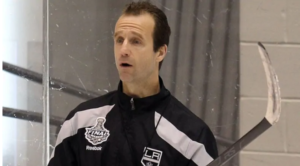
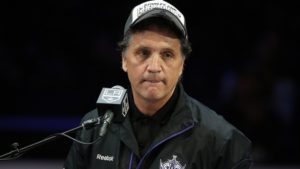
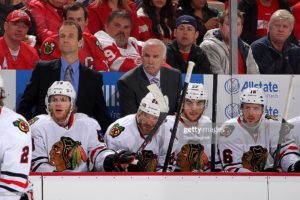
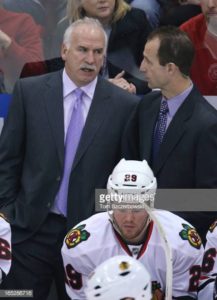
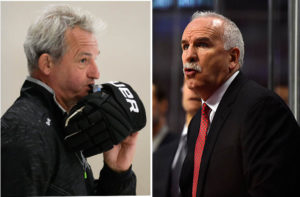
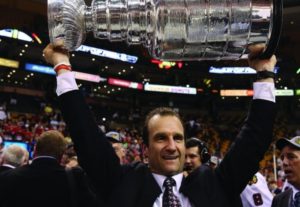
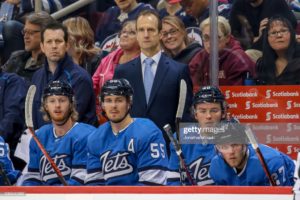
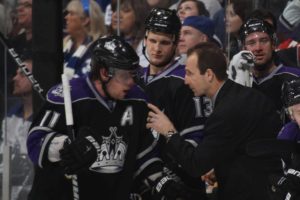
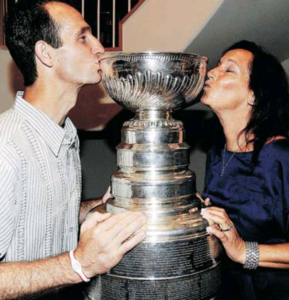



Liza Ramirez
December 30, 2019 at 9:39 am
Thank you, love the article!
GO KINGS GO! 💜💜